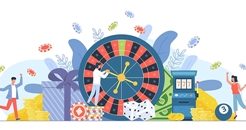 Understanding gambling harm and ways to identify those at risk
Understanding gambling harm and ways to identify those at risk
From an article by the Australian Institute of Family Studies (AIFS)
In the UK, the following statistics were reported in 2021:
-
Overall participation in any gambling activity (in the last four weeks) has fallen to 42% - 26% on National Lottery. (Gambling Commission).
-
Online gambling increased due to the pandemic and inability to do in-person gambling. The online gambling participation rate is 25% (an increase of 3 percentage points on year to June 2020), whilst in person participation is down 8 percentage points to 24%. (Gambling Commission).
-
Average weekly spend varies between £1.10 and £3.20 per week depending on age group. (Statista).
-
43.5% of men and 39.8% of women participated in gambling (in last 4 weeks). (Gambling Commission).
-
There are approximately 280,000 problem gamblers in England. (The Guardian). However, a YouGov survey estimates that there could be 1.4 million problem gamblers across the country. [There are degrees of severity of problem gambling - see below].
-
In addition to losing money, over a quarter of those seeking treatment reported that they had lost their relationship and another 12% their job because of gambling. (Guardian).
-
Great Britain’s gross gambling yield decreased slightly to £14.22 billion in 2019-2020 from £14.31 billion. (Gambling Commission).
The AIFS article describes the types of gambling harm that people can experience and how they can be identified.
What is gambling harm?
Gambling harm is any negative consequence experienced by an individual or members of their social network because of participation in gambling. This can be experienced on a spectrum, ranging from minor negative experiences to crises, and is not always proportionate to the amount of gambling participation. Gambling harms can include:
-
relationship harm e.g. conflict within relationships, neglect of responsibilities
-
health harm e.g. stress, depression, reduced sleep
-
emotional/psychological harm e.g. feelings of regret, worthlessness, failure
-
financial harm e.g. credit card debt, reduced spending on essentials
-
work/study harm e.g. reduced performance due to tiredness, absenteeism.
Harms relating to relationships, health and emotional/psychological wellbeing are the most-reported gambling harms. Family members, such as partners, children and parents of those who gamble, can also experience gambling harms.
How to identify if someone is experiencing gambling harm?
If harms such as those described above are observed, this may be an opportunity for concerned people to determine if they are gambling related. Similarly, if gambling participation is disclosed, concerned people may be able to determine if any harms are occurring – or have occurred as a result.
Screening questions and scales (sets of questions) can help to identify if someone is currently experiencing, or is at risk of experiencing, gambling harm. The Problem Gambling Severity Index (PGSI) can be used to categorise the level of risky gambling behaviour. The PGSI questionnaire asks participants to self-assess their gambling behaviour over the past 12 months by scoring themselves against nine questions. Scores are summed and respondents are categorised into one of four categories:
-
Non-problem gambling (0) - People in this category may or may not gamble frequently with heavy involvement in terms of time and money, but they experience no negative consequences.
-
Low-risk gambling (1-2) - People in this category experience only minor negative consequences, if any. For example, they may very occasionally spend over their limit or feel guilty about their gambling.
-
Moderate-risk gambling (3-7) - People in this category experience less significant negative consequences from their gambling. For example, they may sometimes spend more than they can afford, lose track of time or feel guilty about their gambling.
-
Problem gambling (8+) - People in this category experience severe negative consequences from their gambling. They are likely to gamble heavily and may have lost control. For example, they may often spend over their limit, gamble to win back money and feel stressed about their gambling.
The questions are as follows:
-
Have you bet more than you could really afford to lose?
-
Have you needed to gamble with larger amounts of money to get the same feeling of excitement?
-
Have you gone back on another day to try to win back the money you lost?
-
Have you borrowed money or sold anything to gamble?
-
Have you felt that you might have a problem with gambling?
-
Have people criticised your betting or told you that you had a gambling problem, whether or not you thought it was true?
-
Have you felt guilty about the way you gamble or what happens when you gamble?
-
Has gambling caused you any health problems, including stress or anxiety?
-
Has your gambling caused any financial problems for you or your household?
Score 0 for each time you answer "never"
Score 1 for each time you answer "sometimes"
Score 2 for each time you answer "most of the time"
Score 3 for each time you answer "almost always"
Total the score and then identify the category it fits in above.
If you believe an individual or family is experiencing gambling harm or feel that you yourself are at risk, then there are several help services available. These are usefully listed here on an NHS site.
To sum up, gambling harm can be experienced by people who gamble, as well as their families and social networks. Harms may present as relationship difficulties, financial problems or changes to mental or physical health. However, it is often unclear whether gambling is causing harm to an individual or family member. Asking questions to determine whether any harm from gambling can be identified is important, so that appropriate intervention, referrals and support can be provided.
Read the full article here.
Retweet about this article:
From an article by the Australian Institute of Fam, 15/03/2022